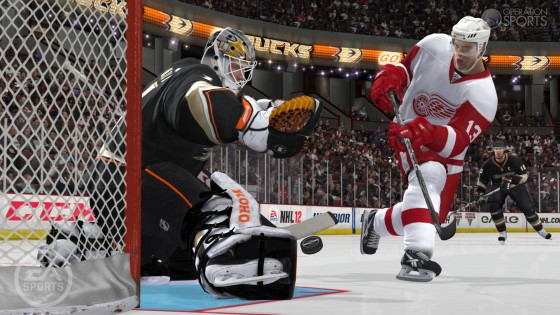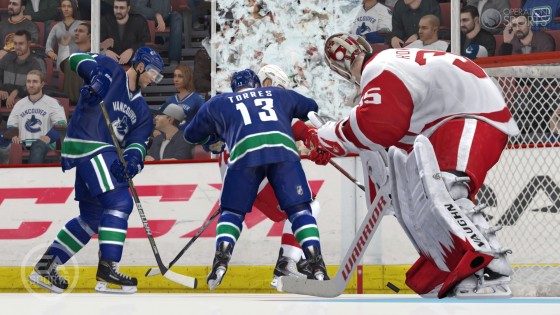

I have to give credit to EA here. Their in-game manual actually does a fairly decent job of explaining the more intricate parts of running the team in GM mode. So if you’re feeling overwhelmed by all these jargons come off season — RFA, salary cap, junior eligibility —sl ow down, take a breath, and go through the manual bit by bit and you should be OK.
The biggest piece of advice is this: keep an eye on your cap room. Not just this year, but the year after, and then the year after that. You may think you're in good stead, with about $12 million of wiggle room. But what you may have forgotten is that four of your young studs are hitting unrestricted free agency in two years time, and you can't keep all of them. If you don't plan for the long term, you may end up losing your stars for nothing.
The solution? Well, you can always trade them for younger and/or cheaper talents. Or when you're negotiating their last contract before they hit unrestricted free agency, try to tack on a few extra years at the expense of a million here and there. It's a delicate balancing act, and what you should do really depends on your cap room and the caliber of players you're negotiating with.

There are also loopholes to really take advantage of the restricted free agency system in the game, but in the interest of keeping the realism alive, I won’t divulge too much, except to say that I find the CPU GMs will rarely, if ever, make moves to gain some cap room to sign a restricted free agent. So hint hint, wink wink, check the RFA in question and his team to see how cheaply you can grab him unopposed. Remember, the lower the salary, the lesser the compensation you have to pony up.
Speaking of contracts, there is one little thing that I would like to address. For those who have played franchise mode in the NHL series, and have learned most of what you know about hockey from it, I have a plea to make: Please, for the love of God, do not make any bar bets about hockey contracts — specifically waiver rules — from the knowledge you picked up in NHL 12. You may very well lose your house if you’ve consumed enough beverages. Having a two-way contract does not automatically mean you can send that player to the minors without passing waivers.
This won’t affect your game in any way, but just so you know, that’s not how it is. The reality is that waiver eligibility and exemption depend on quite a few factors — most of it related to a player’s age and experience. There are too many scenarios to list here, but this is a nice starting point if you’re interested and don't want to flip through the league’s entire collective bargaining agreement (there will be a one coming anyway). Just that next time, don’t brag to your friends—unless, of course, they’re not hockey savvy—by saying your team should send so and so to the minors because they’re on a two-way deal. You may be right, but you may also be very wrong. All a two-way contract does is stipulate that a player will earn one salary if he's playing in the NHL, and a fraction of that salary if he's playing in the lower leagues.

One last thing with regard to franchise modes: If you’re having trouble picking a team to start with, consider the Toronto Maple Leafs. The Maple Leafs are one of NHL’s six original teams (creatively known as the Original Six) along with the New York Rangers, Detroit Red Wings, Boston Bruins, Chicago Blackhawks, and the Montreal Canadiens. While the American teams amongst them have been very successful over the past few years, the Leafs and Canadiens have been mired in misery recently. Well, in the Leafs’ case, not so recently. The Habs —the nickname of the Canadiens — have last won the Stanley Cup in 1993, while the Leafs won theirs in 1967.
Think of the Leafs as hockey’s version of the Chicago Cubs. I know, I know, they’re nowhere near the hundred-year drought, but to many Leafs fans inflicted with what is medically known as the “center-of-the-world” syndrome (typified by one Donald S. Cherry*) it sure feels like a century to them. And besides, compared to the Cubs, this is a franchise with even more instances of shooting themselves in the foot and is a lot harder to love — so why not take up that challenge?
*For those who haven’t heard the name, or have heard the name and isn’t too familiar with who Don Cherry is, he’s a very opinionated ex-coach who voices his opinion (loudly) every Saturday night on the Canadian Broadcasting Corporation’s famed Hockey Night in Canada program. His opinions are mostly antiquated and are often chuckled at, though Canadians are too polite to chuckle to his face. He’s sort of like the aging, rude uncle who says the most offensive things during family dinners but nobody dares to tell him to pipe down, partly because it will just create unnecessary tension. But that also in a twisted way, he’s just so damn funny. In fairness, there are the odd times that Mr. Cherry’s opinions make a lot of sense, though that may just be good proof to the adage that even a broken clock is right twice a day.
And with that, we conclude our brief (OK, somewhat brief) guide to hockey and hockey games. Keep your stick on the ice!




 NBA 2K12: Best Rebounders in the Game
NBA 2K12: Best Rebounders in the Game OS Tip of the Day: Stealing on Weak Armed Catchers
OS Tip of the Day: Stealing on Weak Armed Catchers NCAA 10: Blocking Logic Flaws Make for Big Defense
NCAA 10: Blocking Logic Flaws Make for Big Defense OS Tip of the Day: MLB The Show Franchise Farm Systems
OS Tip of the Day: MLB The Show Franchise Farm Systems NHL 09: How to Become a Better EASHL Teammate
NHL 09: How to Become a Better EASHL Teammate